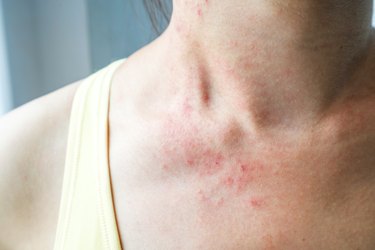
Making changes to your diet can affect your health, both positively and negatively. Some people turn to detox diets to lose weight and remove toxins from the body. During the elimination process, it's possible to experience a detox rash, especially if you are prone to certain skin conditions.
Tip
The symptoms of a detox rash can vary from red, raised, bumps to itchy, dry patches.
Video of the Day
What is a Detox Rash?
A detox affects the skin in different ways. Dr. Susan Massick, MD, a dermatologist at The Ohio State University Wexner Medical Center, tells LIVESTRONG.com that the idea behind a detox is to remove chemicals and "toxins" from your body. The Academy of Nutrition and Dietetics describes detoxification as an ongoing process your body performs that transforms toxins so they can be removed from your body.
Video of the Day
"The main organs that are capable of flushing out unwanted toxins and chemicals from the body are the liver, kidney, GI system and the skin," she explains. "Your skin plays an active role in the elimination process through your pores, and since we sweat through our pores, a common skin reaction that is described with certain detox regimens or elimination diets is a red, bumpy, itchy skin rash," adds Massick.
Plus, if you are prone to certain skin conditions like eczema, you may notice a detox rash or an increase in dry, red, irritated and itchy skin, which are the common symptoms of this skin condition, according to the American College of Allergy, Asthma & Immunology. Detox hives is not a diagnosed condition, but some people may break out in hives from taking certain supplements or eating new foods that are part of the detox.
According to the American Academy of Dermatology (AAD), many foods cause hives, including peanuts and other nuts, eggs and shellfish. Also, if you have a latex allergy, you may notice hives if you eat bananas, kiwis, mangos or chestnuts.
Many detox diets require you to take supplements, and if you are prone to hives, the AAD says some of the additives such as colorings and preservatives that are in vitamins and other supplements may trigger hives.
Do Detoxes Work?
When it comes to detox diets, the internet is full of information, both anecdotally and from experts. If you are making informed choices about your health, it's probably a good idea to get the majority, if not all, of your information, from expert sources.
The Academy of Nutrition and Dietetics points out that many non-credentialed people claim to be experts in detoxification; however, there is a lack of research at this time to support its use. They also express concern that since detoxification programs can vary widely, they may pose a risk for some people (such as people with health problems, those with eating disorders, those who take multiple medications, and pregnant or breast-feeding women).
The Cleveland Clinic explains that detox regimens can be in the form of a fast, diet drink or powder and that the plans that require you to eliminate solid foods have no conclusive medical evidence backing the claim that your digestive tract will heal from skipping solid foods.
They do say that you can benefit from the increased intake of vitamins and minerals if you are doing a detox that requires you to eat more of these healthy foods. Also, if you have a food sensitivity, detox diets can be helpful in figuring out what foods are causing problems.
Healthier Approach to Wellness
The decision to do a detox should not be taken lightly. Despite what you see online or on the cover of your favorite magazine, there are risks associated with these types of diets, and detoxes are not meant for everyone. That's why talking with a medical doctor or registered dietician before considering a detox is critical.
"As a physician, I am a strong advocate for a holistic approach to health and wellness; an active lifestyle coupled with a well-balanced diet and adequate hydration are keys to good health," says Massick. Rather than worry about eliminating toxins from your body, she says the medical community places more emphasis on healthy eating and clean living.
"The detox regimens and diets out there can be too extreme, and a more balanced approach would be to do things in moderation, such as eliminating processed foods and refined sugars while maintaining healthy dietary choices so you don't deprive your body of essential nutrients," explains Massick. She's not alone in her beliefs. The National Center for Complementary and Integrative Health also recommends consumers avoid detoxes or cleansing programs.
Her expert recommendations? In addition to a healthy diet that works to eliminate processed foods and refined sugars, focus on hydration, since it is essential both for overall health and skin health. Also, make sure you are exercising regularly and avoiding stress, which helps in your overall wellbeing. And finally, keep a consistent and adequate sleep schedule.
- The Cleveland Clinic: "Are You Planning a Cleanse or Detox? Read This First"
- Academy of Nutrition and Dietetics: "What's the Deal with Detox Diets?"
- American College of Allergy, Asthma and Immunology: Skin Allergies Causes, Symptoms and Treatments"
- American Academy of Dermatology: "10 Ways to Get Relief From Chronic Hives?"
- National Center for Complementary and Integrative Health: "Detoxes and Cleanses"
- The Ohio State University Wexner Medical Center: "Personal Interview, Dr. Susan Massick"